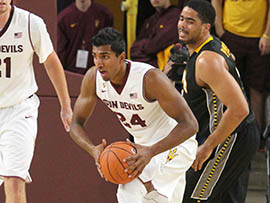Cronkite News has moved to a new home at cronkitenews.azpbs.org. Use this site to search archives from 2011 to May 2015. You can search the new site for current stories.
For some ASU athletes, challenges include honors requirements
TEMPE – Sai Tummala, a junior forward on the Arizona State men’s basketball team, is taking on greater challenges than most student athletes.
And they extend beyond the classes, including organic chemistry and molecular and cell foundations, that he’s taking as an aspiring orthopedic surgeon – with a 4.0 GPA to boot.
As a student in Barrett, the Honors College, Tummala faces extra coursework and must produce a thesis to graduate with honors.
For any NCAA athlete, pulling even average grades can be difficult when so much time and energy is spent on practice, competition and conditioning. But Tummala said the chance to excel in academics and be part of Barrett is a big part of what drew him to ASU.
“This is the best honors college in the country,” he said. “I had the opportunity to go to a bunch of Ivy League schools, but the experience I’ve had here has been absolutely fantastic.”
Tummala is one of 38 student athletes at ASU who are also students in Barrett, a number that has seen steady growth since 2000.
Kristen Hermann, associate dean for students at Barrett, said the honors college is enrolling more athletes because coaches are recruiting higher-caliber students.
“Coaches more and more are recognizing that the best students on the field are oftentimes the best athletes on the field,” she said. “They aren’t faced with the kinds of emotional transitions because they already feel confident in their academic skill set.”
Honors student Chris Beall, an outfielder for ASU’s baseball team, said he’s improved as a leader through his time at Barrett.
“It enhances your leadership abilities, so definitely being able to pull someone aside in practice and clearly tell them what they can work on,” he said. “So I can help the team rather than waiting for a coach to take care of it.”
While the Barrett program can be challenging, Beall said more athletes should apply and enroll.
“A lot of them can but they’re afraid of the name ‘the Honors College’ and that it’s going to be a lot more work,” he said. “I urge them: If they can do it, it’ll pay off for them.”
Tummala, who graduated from Brophy Prep before redshirting at Michigan in 2011-2012 and playing for Salt Lake Community College in 2012-2013, said Barrett puts him in small classes where he is pushed to contribute to the lessons and learn from his peers, not just from the professor.
“That’s what they teach you: Don’t just stay in your shell, be a part of the community, learn and teach,” he said. “I think the opportunity to play on this team is one of the best ways I can do that.”
On top of his classroom studies, to graduate with honors Tummala must create and defend a thesis, a culmination of his studies in the form of an original project. His focuses on biology secondary education, proposing a bridge program to help high schoolers transition into science majors at universities.
Tummala said being an honors student comes with stereotypes – for example, that he had a bad game because he was studying for a test.
“There’s definitely nights where it’s tough, I have to stay up until 3, 4, 5 in the morning for a test … but that’s what the regular student experience is.”
Men’s basketball assistant coach Stan Johnson said peers and coaches only have respect for what Tummala is taking on.
“We do understand that some days he might be physically or mentally out of it because maybe he stayed up and only slept for three hours,” he said. “So we have a lot of respect for him because we know what he’s doing.”
Johnson said criticism strikes Tummala from time to time, especially when his numbers on the court are less than desirable, but he said Tummala puts the same amount of work into his basketball as his studies.
“If you’re serious about both, it takes special dedication, but it can be done,” Johnson said.
Hermann, the Barrett associate dean, said while the dual responsibility is challenging for students, it pushes athletes to excel in all facets of their lives.
“I think when you can prove yourself in multiple environments, that just builds your confidence,” she said. “Even if students don’t achieve (on the field), there’s a propensity to be confident.”
Hermann said schools like ASU are looking for scholar athletes because of their efficiency on the field and, when it comes to choices, ASU is just as prominent in honors athletes as Stanford.
She said the importance behind athletes chasing academic excellence runs much deeper to ASU students than getting degrees or high GPAs.
“It’s about their preparation for life, thinking about who they are down the road,” Hermann said. “I think that’s what we’re in the business of doing – be good citizens, take their excellence, discipline and identity into any sphere and be successful.”
Tummala said life after basketball is something he’s planning for.
“The ball stops bouncing someday, for everyone,” he said. “As much as that sucks, it happens. For most people, this doesn’t go further than 20 or 25, at the most 30, and you still have a big portion of your life where you’re going to be doing something else.”







